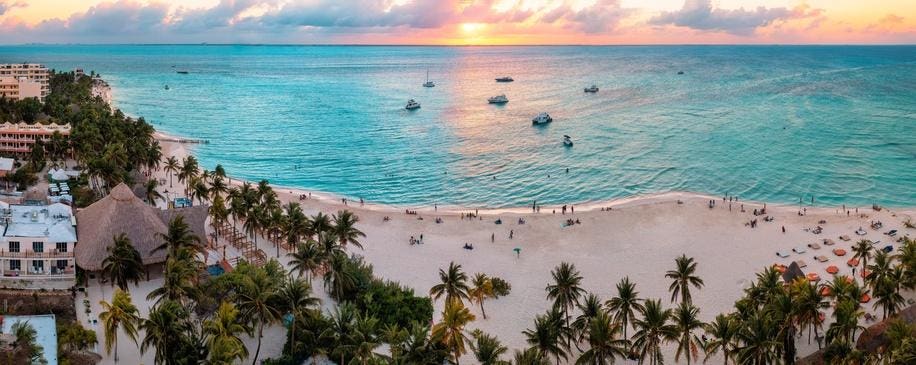From Cancun to Tokyo, where are you going this summer, America?
In its annual travel trends report, the card issuer reveals where Americans are going, with new economic insights on why.
Americans are traveling abroad in record numbers this year.
As we head into Memorial Day weekend, a new report from the Mastercard Economics Institute, which tracks anonymized spending data, reveals that a record 15.9 million Americans traveled abroad in the first quarter of this year. U.S. passenger traffic to overseas countries is now 20% higher than the pre-COVID-19 record.
Given the strength of the dollar and the relative health of the U.S. economy, economists see no signs of demand slowing. So it's official: Americans can't wait to go on vacation. But this study also reveals more clues about where U.S. consumers are going, why they're going there, and their price sensitivity when they get there.
For example, consumers are extending their trips by four to five days on average, in order to have a more “immersive and meaningful” travel experience.
“In the experience economy, you see a largely price-tolerant consumer willing and able to spend. But they are deploying more of that purchasing power toward experiences rather than material goods,” says Michelle Meyer, chief economist and director of the Mastercard Economics Institute. It also notes that spending on experiences totals 12% of tourism sales, the highest level in at least five years.
At the same time, travel prices have increased significantly. In the United States, the average airfare increased by more than 20% in March 2024 compared to 2019; the average hotel room, for the same period, increased by 15%.
Consumers are adapting. Many choose to take a cruise instead of booking an expensive hotel. According to Mastercard, spending on cruises is up 16% in 2024 compared to 2019, driven in part by the perceived value of vacations at sea. According to the report, “given the persistent rise in prices in the hotel sector, the The price difference between cruises and hotels has widened, making cruise travel a relatively more economical option in many cases. »
That said, cruise ships are brilliantly effective at upselling on multiple levels. Spending on wellness treatments, premium alcohol, or shore excursions—that is, guided “experiences” sold as add-on amenities—can quickly narrow the price gap between paying for a hotel or cruise. Today, all major players, including Royal Caribbean, Windstar Cruises, Virgin JourneysAnd Celebrity cruises offers increasingly extravagant tailor-made shore excursion packages.
“People are becoming more strategic about how, when and where they travel, and 2024 will see significant changes in travel habits,” adds Meyer. According to the latest data from Mastercard, this is where demand is “gaining momentum over the next three months” among U.S. travelers.
“Travel Trends 2024: Breaking Boundaries,” a new report from the Mastercard Economics Institute.
The 10 trendiest summer destinations for Americans in 2024
- Cancun, Mexico
- Oranjestad, Aruba
- London, United Kingdom
- Rome, Italy
- Punta Cana, Dominican Republic
- San Juan, Puerto Rico
- Athens, Greece
- Barcelona, Spain
- Tokyo, Japan
- Santiago, Dominican Republic
All of these places have a robust tourist infrastructure and a warm summer climate. Destinations like Cancun and San Juan are home to famous resorts that actively attract Americans, with beautiful beaches and direct commercial flights. Athens is the gateway to Greece and will soon welcome a new 600 acre park on the site of an abandoned airport. London is in third place thanks to Taylor Swift and her Tour of the eras, which attracts American Swifties in droves in August. International football tournaments have a similar effect.
Tokyo has become a favorite after keeping its borders closed to tourists for almost two and a half years during the pandemic. Since then, tourism has boomed, with a record influx of three million international visitors in March 2024, according to the Japan National Tourism Organization. The historical weakness of the yen has played an important role in this phenomenon.
The key takeaway is this: the affordability of a destination is very important – and could explain why Paris, France, for the 2024 Olympics, is not on this list.
According to Mastercard economists and data scientists, there is also a clear inverse relationship between destination price and the additional number of days tourists spend in those destinations. The cheaper the destination, the longer the stay, which in turn benefits local economies.
On a macro level, today's tourists are inundated with choice, yet they are getting better and better at finding great deals and choosing destinations that offer value, however they choose to travel. define it.
To dig deeper into the findings, see “Travel Trends 2024: Breaking Boundaries,” the full report from the Mastercard Economics Institute, at mastercardservices.com.


